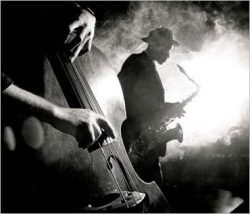Blog, Chroniclers, Jazz on the Tube Interview, Ornette, Podcasts
Download the mp3 here
Within months of picking up the saxophone, Ornette was a working musicians in some of the scariest dives in Fort Worth, bringing home much needed money for his family whose father, a baseball player and singer, died when Ornette was seven.
We talk about this and other topics and read from A.B. Spellman’s classic: “Four Lives in the Bebop Business”
Erratum: Spellman refers to Melvin Lastie as “Melvin Lassister, a clarinetist.” It’s possible Melvin also played the clarinet, but he was most known for his trumpet playing.
The Lastie clan is one of the great New Orleans musical families and includes Herman Riley and the Andrews clan (James, Troy and Glenn) in their extended family. Frank Lastie introduced gospel drums to the Spiritual Church. and played with Louis Armstrong in the Waif’s Home Band. The family was very important in the Spiritual Church.
Others episodes from “Ornette: Deep from the Heart of Texas” here:
Part One: Ornette: Deep from the Heart of Texas – Conversation with Dave Oliphant
Part Two: Ornette in Amarillo
– Ken McCarthy
Jazz on the Tube
P.S. Our unique programming is made possible by help from people like you. Learn how you can contribute to our efforts here: Support Jazz on the Tube
Thanks.
Afro-Cuban culture, Artist-Educators, Cuba, Jazz on the Tube Interview, Latin Jazz, Podcasts, Producer-Presenters, Puerto Rico, Video, Video and audio
Download the mp3 here
Produced by Coco Records in 1974
– Ken McCarthy
Jazz on the Tube
P.S. Our unique programming is made possible by help from people like you. Learn how you can contribute to our efforts here: Support Jazz on the Tube
Thanks.
Go to Cuba with Jazz on the Tube as your guide:
Click here for details
Artist-Educators, Blog, Chroniclers, Jazz on the Tube Interview, Podcasts, Video
Interview with Abraham Ravett
Download the mp3 here
Ken McCarthy’s Jazz on the Tube interviews filmmaker Abraham Ravett about his film “Forgotten Tenor: A Tribute to Tenor Saxophonist Wardell Gray.”
Tenor saxophone giant Wardell Gray was born February 13, 1921, in Oklahoma City. OK. He was a graduate of the Cass Technical High School, a Detroit school that also lists Donald Byrd, Lucky Thompson, and Al McKibbon as distinguished alumni.
You can order a DVD copy of the film “Forgotten Tenor: A Tribute to Saxophonist Wardell Gray” direct from the filmmaker by writing to aravett AT hampshire DOT edu
Wardell is the soloing tenor on this Count Basie performance
You can order a DVD copy of the film “Forgotten Tenor: A Tribute to Saxophonist Wardell Gray” direct from the filmmaker by writing to aravett AT hampshire DOT edu
– Ken McCarthy
Jazz on the Tube
P.S. Our unique programming is made possible by help from people like you. Learn how you can contribute to our efforts here: Support Jazz on the Tube
Thanks.
Artist-Educators, Blog, Chroniclers, Jazz on the Tube Interview, Podcasts
Interview with Vic Hobson
Download the mp3 here
Louis Armstrong was a genius – no doubt about that.
But there’s no such thing as a genius in a vacuum.
For some strange reason, the culture and community that gave birth to Louis Armstrong is given short shrift in accounts of his life and art.
In his autobiography and in interviews, Armstrong painted a vivid picture of the world he grew up in, but until now, there has been no in-depth inquiry into what he meant when he said things like “I figure singing and playing is the same,” or, “Singing was more into my blood than the trumpet.”
Now thanks to Vic Hobson’s book “Creating the Jazz Solo” we’re starting to understand what he meant.
Click here to learn more about Vic Hobson’s work:
More
Comments and insights sought (scroll to the bottom of the page)
Comments and insights sought from musicians, music educators and scholars. We’re opening this up to a moderated discussion.
Our goal: To discover if there was something valuable and now lost in music education that can be productively revived.
Musical references:
– Ken McCarthy
Jazz on the Tube
P.S. Our unique programming is made possible by help from people like you. Learn how you can contribute to our efforts here: Support Jazz on the Tube
Thanks.
Afro-Cuban culture, Artist-Educators, Blog, Cuba, Cuban Jazz, Jazz on the Tube Interview, Podcasts
Jazz on the Tube brought Gilberto (left) and his friend
David Amram together again in Havana after a 40 year absence
Interview with Gilberto Valdés Zequeira
Download the mp3 here
Gilberto Valdés Zequeira was born in Havana on August 16, 1928.
Note: His mother was a milliner (hat), not a millionaire.
As a kid he listened to Chano Pozo’s rehearsals in the Colon neighborhood of Havana.
His vocal group had a weekly gig at the San Souci night club in Havana and he appeared on Cuba’s pioneering television channel twice a week in the 1950s.
Roy Haynes introduced him to American jazz drumming and gave him his first set of drumsticks.
He performed with his old friend Bebo Valdés when the two of them found themselves in Europe in the early 1960s.
He spent time as the #2 man at Egrem.
He was Dizzy Gillespie’s host when Dizzy visited Havana in 1977.
He introduced Irakere to Columbia Records and toured the world with them as their manager.
He helped save Cuba’s most important jazz club La Zorra y el Cuervo from being turned into a pizzeria.
And that’s just the tip of the iceberg of Gilberto’s remarkable life.
Click here to learn more about Gilberto.

Havana’s top nightclub Sans Souci (1958)
– Ken McCarthy
Jazz on the Tube
P.S. Our unique programming is made possible by help from people like you. Learn how you can contribute to our efforts here: Support Jazz on the Tube
Thanks.
Blog, Chroniclers, Jazz on the Tube Interview, Podcasts
Interview with Hugh Wyatt
Download the mp3 here
Hugh Wyatt was part of the group that put the legendary New York radio station WBLS on the air and saved the Apollo Theater.
For nearly thirty years, he wrote and edited for New York Daily News.
And he’s enjoyed a long friendship with Sonny Rollins,
In this landmark book, Hugh not only shares some previously unknown details of Sonny’s life and evolution as an artist, he also goes into depth on a little appreciated fact of jazz history: the serious spiritual seeking that characterizes Sonny’s life and the lives of many of the great artists whose work formed jazz as we know it today.
You can get information on Hugh’s book through his publishing company: Kamama Books
– Ken McCarthy
Jazz on the Tube
Music credit: The Jazz on the Tube podcast theme song is “Mambo Inferno” performed by The Manhattan School of Music Afro-Cuban Jazz Orchestra conducted by Bobby Sanabria from the CD ¡Que Viva Harlem!




